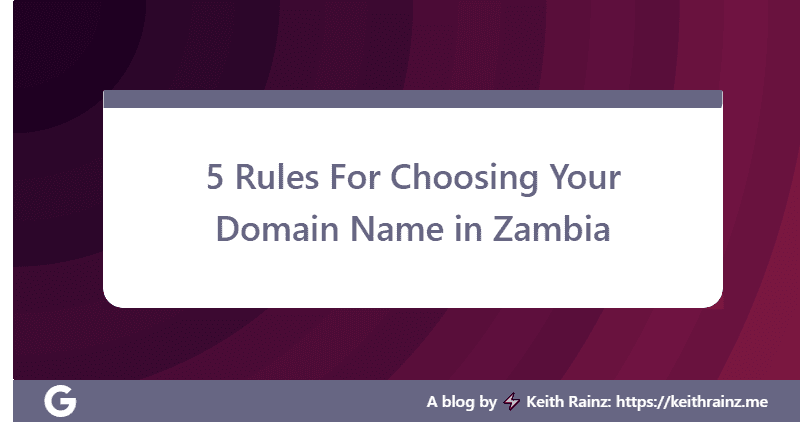Learn the 5 Rules For Choosing Your Domain Name. in Zambia. A domain name is a website name you click on in search results or type in in search bar, for example google.com
- Give it a Brandable Title. Your domain name should roll off your tongue and call to mind your business specifically. If you choose a generic domain name and extension, then people wont be able to easily recall it. It should be simple and succinct. If you put in numbers or hyphens, you risk over-complicating the message.
As part of this, you should also stay away from strings of keywords in your domain. Keywords are okay, so long as they work together with a unique element to give your domain a brandable look and feel. - Keep it Short. A long and complicated domain name will never work well for you. It should be something people can quickly and easily type into their address bar. If people have to Google your brand to find the website, then you know your domain is too complicated.
In general, it should be as short as possible without sacrificing the pronounceability of the name. You should be able to say it out loud as if in conversation with someone else, but it shouldn’t be so long that it becomes its own sentence.
A few words is usually a good length. Remember, something that rolls off the tongue. - Easy to Interpret. The ideal scenario with your domain is that someone can look at it, and easily guess what your company does. There is a balance to be found here between clever and informative. It should be a generally recognized term that also implies your website’s purpose.
An example would be a website that sells retro video games and accessories. You wouldn’t want to do something too specific and alienate people who aren’t gamers, so instead you would focus on something that is more generally understandable.
NostalgiaGaming.com sounds good, and its brandable. The nostalgia term calls to mind fond memories of games when we were younger. Focus on achieving something that immediately calls to mind the purpose of your business. - Target Broad Keywords. Implementing keywords in your domain can help with SEO, but you shouldn’t be obsessed with the pursuit of these terms. Exact or even partial matches are something Google is slowly moving away from.
That being said, if you can incorporate a relevant keyword and use it as part of your interpretation and branding, then by all means, go for it. Don’t be afraid to be creative with it as well. Remember that Amazon and Google have names that have nothing to do with their services.
Instead, their names have become brands that are immediately associated with them. - It’s Okay to Modify Your Name. If your name is taken, it’s not the end of the world. You have options like choosing another TLD extension, or you can modify the name slightly. You can change the name by adding a prefix or suffix, or even get creative with how you present it.
While it can be frustrating to have your primary choice taken, it’s also an opportunity to flex your creativity by pursuing other options. - Common Options For TLDs (And When to Use Them). There are over 400 different extensions available, so we won’t be able to cover them all here, but let’s take a look at the most popular options, and when there best used as an extension for your domain:
.com (commercial) This is the most popular extension and originally stood for commercial sites, but now it is used for all kinds of websites.
.net (network) Originally intended for networked websites, this domain extension is used for a wide variety of purposes today. This is a good backup if your ideal choice is taken in the .com extension. It’s also good for tech companies as implies technology and networking.
.org (organization) “ meant for organizations. Best used if your website is for a nonprofit company. Not the ideal solution if you âre a business as it sends mixed messages.
.edu (education) “ This one isn’t typically available for public registration, and is instead used by colleges and educational institutions.
.info (information) “ This is best used if your website is purely there for information or as a database of knowledge. If you âre not selling anything, then this domain could work well.
.biz (business) “ An alternative to .com domains for businesses, but it does have some bad connotations because of spammy sites using it.
.me (personal) “ This extension is often used for personal websites or blogs that have no commercial intent like mine https://keithrainz.me/
These are the most common options, but they are a fraction of the total options. Other choices like .name, .pro, .tv, and many more are used for very specific businesses or industries. These are only a viable option if you have a very focused business model, or your website is focused on an individual.
Now, the extension is just a piece of your full domain. The extension and domain name should work together to create a cohesive brand for your website. In the spirit of this, let’s take a look at some golden rules for choosing your domain name.






